Filter by
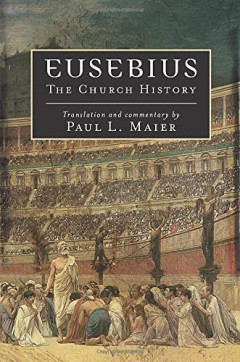
Eusebius: The Church History
Often called the "Father of Church History," Eusebius was the first to trace the rise of Christianity during its crucial first three centuries from Christ to Constantine. Our principal resource for earliest Christianity, The Church History presents a panorama of apostles, church fathers, emperors, bishops, heroes, heretics, confessors, and martyrs. This paperback edition includes Paul L. Maier'…
- Edition
- -
- ISBN/ISSN
- 9780825433078
- Collation
- Softcover; 368 hlm.; 13 x 20 cm
- Series Title
- -
- Call Number
- 270.1
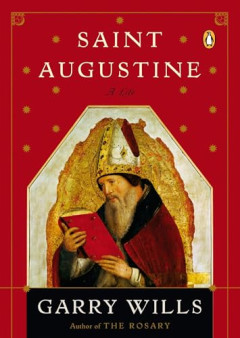
Saint Augustine: A Life
Garry Wills examines this famed fourth-century bishop and seminal thinker whose grounding in classical philosophy informed his influential interpretation of the Christian doctrines of mind and body, wisdom and God. Saint Augustine explores both the great ruminator on the human condition and the everyday man who set pen to parchment. It challenges many misconceptions - among them the myth of Aug…
- Edition
- -
- ISBN/ISSN
- 9780143035985
- Collation
- Softcover; 173 hlm.; 12.7 x 18 cm
- Series Title
- -
- Call Number
- 270.2092

Augustus to Constantine: The Rise and Triumph of Christianity in the Roman World
This masterful study of the early centuries of Christianity vividly brings to life the religious, political, and cultural developments through which the faith that began as a sect within Judaism became finally the religion of the Roman empire. First published in 1970, Grant's classic is enhanced with a new foreward by Margaret M. Mitchell, which assesses its importance and puts the reader in to…
- Edition
- -
- ISBN/ISSN
- 9780664227722
- Collation
- Softcover; 392 hlm.; 15 x 23 cm
- Series Title
- -
- Call Number
- 270.1
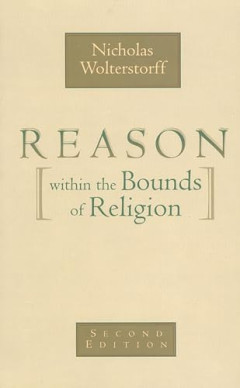
Reason Within the Bounds of Religion
Expanding on his 1976 study of the bearing of Christian faith on the practice of scholarship, Wolterstorff has added a substantial new section on the role of faith in the decisions scholars make about their choice of subject matter.
- Edition
- 2
- ISBN/ISSN
- 0802816045
- Collation
- Softcover; 161 hlm.; 12.5 x 20.3 cm
- Series Title
- -
- Call Number
- 215
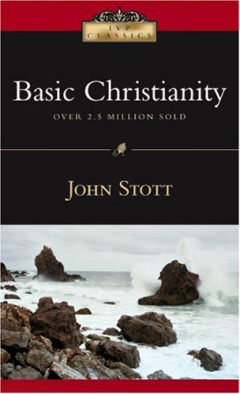
Basic Christianity
John Stott embarks on a compelling course of study that first defends the fundamental claims of Christianity and then defines the proper outworkings of these basic beliefs in the daily lives of believers. Here is a sound, sensible guide for those who are seeking an intellectually satisfying presentation of the Christian faith.
- Edition
- 3
- ISBN/ISSN
- 9780830834037
- Collation
- Softcover; 179 hlm.;
- Series Title
- -
- Call Number
- 230
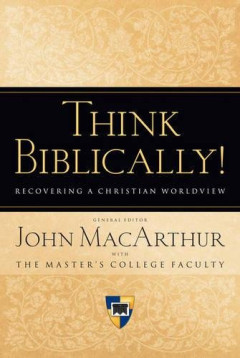
Think Biblically!: Recovering a Christian Worldview
What we think shapes who we are. That's why the Bible tells us, "Do not be conformed to this world, but be transformed by the renewal of your mind" (Romans 12:2a). In a world of differing voices competing for our allegiance, we must learn to "think biblically" so we can distinguish good from evil. God is the Creator of this world; his voice-his Word-must guide our thoughts and our lives. Wit…
- Edition
- 1
- ISBN/ISSN
- 1581344120
- Collation
- Hardcover; 368 hlm.; 15.9 x 24 cm
- Series Title
- -
- Call Number
- 230
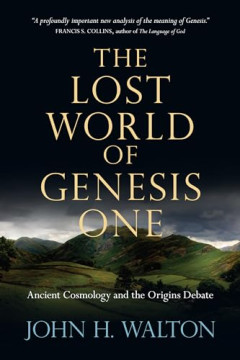
The Lost World of Genesis One: Ancient Cosmology and the Origins Debate
In this astute mix of cultural critique and biblical studies, John H. Walton presents and defends twenty propositions supporting a literary and theological understanding of Genesis 1 within the context of the ancient Near Eastern world and unpacks its implications for our modern scientific understanding of origins. Ideal for students, professors, pastors and lay readers with an interest in the …
- Edition
- -
- ISBN/ISSN
- 9780830837045
- Collation
- Softcover; 175 hlm.; 14 x 21 cm
- Series Title
- -
- Call Number
- 231.765
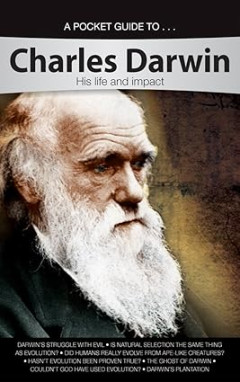
A Pocket Guide To Charles Darwin: His life and Impact
How did Charles Darwin come to believe in evolution? Did his daughter's death turn him from Christianity? What is natural selection? Did humans really evolve from ape-like creatures? Has evolution been proven true? Couldn't God have used evolution? These and other questions are answered in this Pocket Guide to Charles Darwin. Looking at the course of his life, Darwin was influenced by many p…
- Edition
- -
- ISBN/ISSN
- 9781600922565
- Collation
- Softcover; 96 hlm.; 11.4 x 18 cm
- Series Title
- -
- Call Number
- 213

A Pocket Guide To A Young Earth: Evidence That Supports the Biblical Perspective
Is the earth billions of years old or just thousands? Are radiometric methods of dating rocks and fossils reliable? What evidences support a young age for the earth? Where did the idea of "millions of years" come from? How old is the earth? Most secular scientists believe the earth to be billions of years old. They most often use radiometric dating methods to support this assertion. But, do the…
- Edition
- -
- ISBN/ISSN
- 9781600923036 / 1600923038
- Collation
- Softcover; 96 hlm.; 11.3 x 27.9 cm
- Series Title
- A Pocket Guide To...
- Call Number
- 213
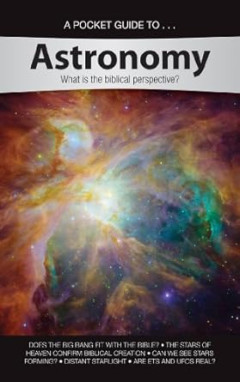
A Pocket Guide To Astronomy: What Is the Biblical Perspective?
Did the universe start with a big bang? Does distant starlight prove the universe is old? What are black holes and how do they form? Can we see stars forming? Are ETs and UFOs real? Secular astronomers teach that the universe began to form more than 12 billion years ago by chance, through what has become known as the "big bang." However, there is strong evidence that points to a young age for t…
- Edition
- -
- ISBN/ISSN
- 9781600923029 / 160092302X
- Collation
- Softcover; 96 hlm.; 11.3 x 18 cm
- Series Title
- A Pocket Guide To...
- Call Number
- 213
 Computer Science, Information & General Works
Computer Science, Information & General Works  Philosophy & Psychology
Philosophy & Psychology  Religion
Religion  Social Sciences
Social Sciences  Language
Language  Pure Science
Pure Science  Applied Sciences
Applied Sciences  Art & Recreation
Art & Recreation  Literature
Literature  History & Geography
History & Geography